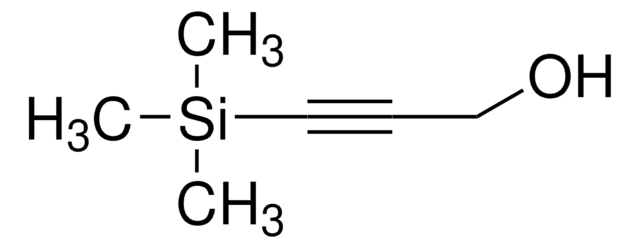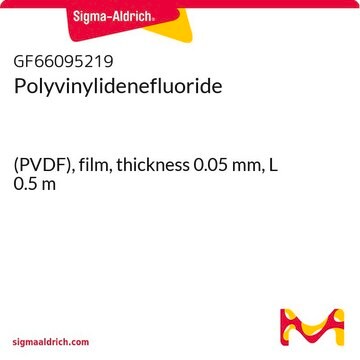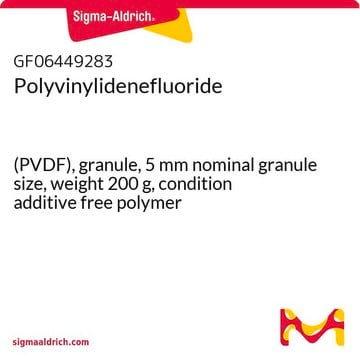347078
Poly(vinylidene fluoride)
average Mw ~530,000, pellets
Synonym(s):
PVDF
Sign Into View Organizational & Contract Pricing
All Photos(2)
About This Item
Linear Formula:
(CH2CF2)n
CAS Number:
MDL number:
UNSPSC Code:
12162002
PubChem Substance ID:
NACRES:
NA.23
Recommended Products
vapor pressure
15 mmHg ( 32 °C)
form
pellets
mol wt
average Mw ~530,000
SMILES string
FC(F)=C
InChI
1S/C2H2F2/c1-2(3)4/h1H2
InChI key
BQCIDUSAKPWEOX-UHFFFAOYSA-N
Looking for similar products? Visit Product Comparison Guide
Related Categories
Application
- A critical analysis of the α, β and γ phases in poly (vinylidene fluoride) using FTIR: This study provides detailed insights into the different crystalline phases of PVDF, which are crucial for applications in sensors and actuators (Cai et al., 2017).
- Properties and applications of the β phase poly (vinylidene fluoride): This research explores the unique properties of the β phase of PVDF, widely used for its piezoelectric and ferroelectric properties, relevant in various technological applications (Ruan et al., 2018).
- Ultrahigh β-phase content poly (vinylidene fluoride) with relaxor-like ferroelectricity for high energy density capacitors: This article discusses the potential of high β-phase PVDF in energy storage applications, which could interest material scientists focusing on energy solutions (Meng et al., 2019).
- Multiscale-structuring of polyvinylidene fluoride for energy harvesting: This study investigates how different scales of structural modification affect the energy harvesting capabilities of PVDF, important for both material science and sustainable energy research (Wan & Bowen, 2017).
- Recent advances in poly (vinylidene fluoride) and its copolymers for lithium-ion battery separators: This review highlights the applications of PVDF in the development of lithium-ion battery separators, essential for advancing energy storage technologies (Barbosa et al., 2018).
Storage Class
11 - Combustible Solids
wgk_germany
WGK 3
flash_point_f
Not applicable
flash_point_c
Not applicable
ppe
Eyeshields, Gloves, type N95 (US)
Certificates of Analysis (COA)
Search for Certificates of Analysis (COA) by entering the products Lot/Batch Number. Lot and Batch Numbers can be found on a product’s label following the words ‘Lot’ or ‘Batch’.
Already Own This Product?
Find documentation for the products that you have recently purchased in the Document Library.
Customers Also Viewed
Vincent S D Voet et al.
Nanoscale, 5(1), 184-192 (2012-11-10)
The fabrication of nanoporous poly(vinylidene fluoride) (PVDF) and PVDF/nickel nanocomposites from semicrystalline block copolymer precursors is reported. Polystyrene-block-poly(vinylidene fluoride)-block-polystyrene (PS-b-PVDF-b-PS) is prepared through functional benzoyl peroxide initiated polymerization of VDF, followed by atom transfer radical polymerization (ATRP) of styrene. The
Eugene Cho et al.
Journal of nanoscience and nanotechnology, 13(1), 674-677 (2013-05-08)
Electrospun polyvinylidene fluoride (PVDF) nanofiber membranes have 3-dementional (3-D) open pore channel and hence have excellent application potential in Western blot. In this study we have modified electrospun PVDF nanofiber membrane by argon (Ar) plasma treatment to improve the surface
Orang Seyeddain et al.
Journal of cataract and refractive surgery, 39(2), 234-241 (2012-12-19)
To report the 2-year postoperative safety and efficacy outcomes after monocular Kamra corneal inlay (ACI7000PDT) implantation in femtosecond laser-created corneal pockets of emmetropic presbyopic patients to improve near and intermediate vision. University Eye Clinic, Paracelsus Medical University, Salzburg, Austria. Prospective
Yanming Liu et al.
Analytical chemistry, 84(18), 7603-7606 (2012-08-31)
We describe a single-cycle DNA aptamer selection strategy that is able to obtain high affinity aptamers (K(d) of sub-nM) directly from a protein blotted on membrane. The key to the success of this strategy is the unique use of DNase
Archana Kayyar et al.
Journal of visualized experiments : JoVE, (66)(66), e4104-e4104 (2012-08-17)
Rechargeable lithium ion batteries have wide applications in electronics, where customers always demand more capacity and longer lifetime. Lithium ion batteries have also been considered to be used in electric and hybrid vehicles or even electrical grid stabilization systems. All
Our team of scientists has experience in all areas of research including Life Science, Material Science, Chemical Synthesis, Chromatography, Analytical and many others.
Contact Technical Service






